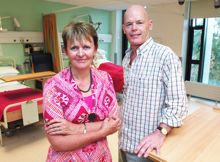2010 Press Releases
28.06.2010
Scientists at University College Cork, Teagasc and the University of Alberta have identified a new antibiotic, thuricin CD, that is effective against the hospital-acquired superbug Clostridium difficile.
The research, funded by Science Foundation Ireland, is published, today 28/6/10, in the Proceedings of the National Academy of Sciences of the USA.
C. difficile is the most rapidly increasing hospital-acquired illness in the Western world and is a major cause of death, particularly in the elderly. It is estimated that the annual cost of treating the diarrhoea (CDAD) associated with C. difficile amounts to €3 billion, in the EU alone.
C. difficile infections arise as a direct result of disturbing gut bacteria following antibiotic treatment. Current antibiotics of choice for the treatment of the diarrhea (CDAD) associated with C. difficile are the broad spectrum antibiotics vancomycin or metronidazole, but treatment failures and recurrence of infection are common. The emergence of strains with increased resistance to these antibiotics has also been reported.
The new antibiotic (antimicrobial peptide) which is licensed to Alimentary Health Ltd could reduce the risk of disease recurrence compared with that of broad-spectrum antibiotic treatment because it spares the normal gut flora that helps limit C. difficile growth.
“Recovery of normal gut flora is important for recovery from C. difficile-associated disease, but the use of broad spectrum antibiotics can delay this process,” says Colin Hill, a professor of microbial food safety in the Alimentary Pharmabiotic Centre at University College Cork.
Given the importance of normal gut flora in controlling C. difficile growth, Professor Hill and colleagues, Professor Paul Ross and Mary Rea at the Teagasc Moorpark Food Research Centre analysed the very bacterial populations that keep C. difficile at bay during normal conditions, with the goal of finding a compound that could specifically eliminate this organism.
The potent new antibiotic peptide was discovered by screening over thirty thousand bacteria isolated from the human gut. The first study describes how thuricin was identified, purified and characterised. Thuricin CD consists of two distinct peptides that act together to kill a wide range of clinical C. difficile. This specificity of thuricin towards Clostridium difficile is a key advantage it has over other antibiotic treatments.
The second study shows that thuricin compares very favourably with standard antibiotics in terms of controlling C. difficile in a model of the human colon. It has the significant advantage that it does not have an impact on other bacteria in the gut (very little 'collateral' damage). This is important because it is the disruption of other bacteria that leads to outgrowth of C. difficile and is an important factor in recurrence of the disease. “We have developed an in vitro colon model and shown that thuricin actively kills C. difficile, so the compound should work in vivo,” says Professor Hill. “But we need to develop a way to deliver it.”
Co-authors Professor Colin Hill, APC and Professor Paul Ross, Teagasc, congratulated Mary Rea, the lead author of the published research, who conducted the key experiments on Thuricin CD as part of her PhD research. The complete study, published as two papers in the Proceedings of the National Academy of Sciences of the USA, involved the combined efforts of a team of scientists and students from Ireland and Canada.
PNAS (Proceedings of the National Academy of Sciences of the United States of America) is one of the world's most-cited and prestigious multidisciplinary scientific journals. The journal was established in 1914 and its coverage spans the biological, physical, and social sciences.
Thuricin CD is licensed by the Alimentary Pharmabiotic Centre (APC) to Irish biotechnology company Alimentary Health Ltd.
Picture: Ms Mary Rea and Professor Colin Hill in the Clinical Skills Simulations Resource Centre in the School of Nursing & Midwifery, UCC
RMcD

